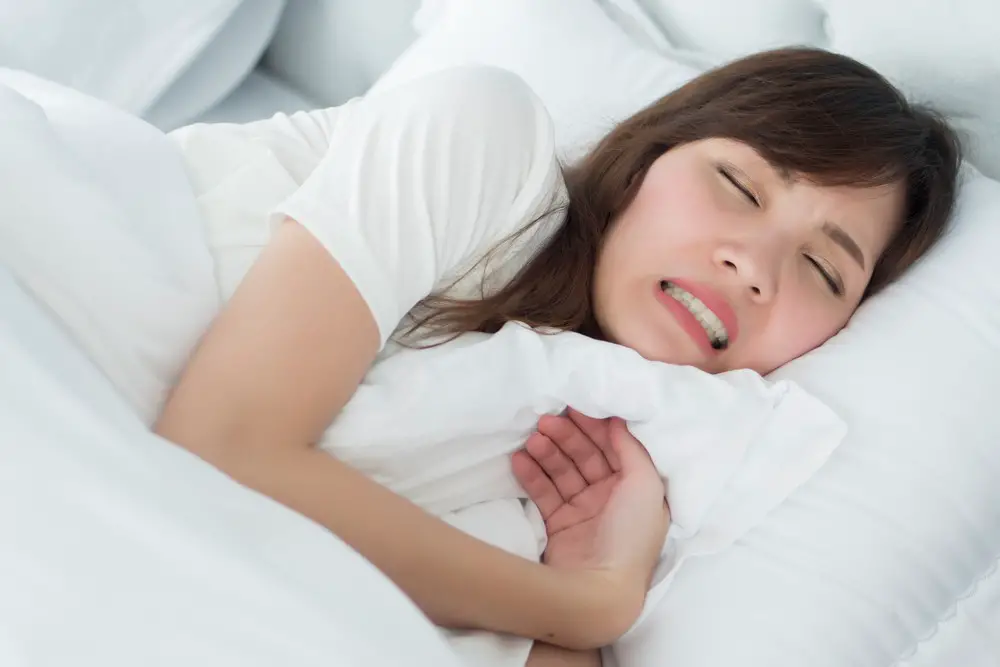As a BetterHelp affiliate, we receive compensation from BetterHelp if you purchase products or services through the links provided
You might wake up in the morning with a headache or pain in your jaw or teeth. All these are signs of tooth grinding, also known as bruxism.
Teeth grinding, also known as bruxism, disrupts an individual’s sleep while causing jaw pain and tooth problems. If you are experiencing this condition, you need to seek medical treatment. Read on to learn why treating teeth grinding will help you sleep better.
What Is Teeth Grinding?
Bruxism involves forceful grinding and clenching of teeth when you sleep. It is a condition that can affect people of all ages, from children to young adults. It is also known to affect 10% of adults and 15% of children. However, bruxism is mainly caused by sleep disorders, stress and anxiety, and behavioral habits such as consuming alcohol or caffeine, smoking, or using drugs.

Signs And Symptoms of Teeth Grinding
Since teeth grinding most often happens during the night, you may be unaware that you are grinding your teeth. You may, however, wake up in the morning experiencing the following symptoms:
- Headaches or Facial Pain
- Painful Jaw Muscles
- Pain while Eating
- Disturbed Sleep
- Teeth Fractures
- TMJ disorder (where your jaws make clicking or popping sounds)
- Worn Out Teeth
It is dangerous to your oral and sleeps health. If you experience any of these signs and symptoms, you should book an appointment with a dentist and get diagnosed.
3 Key Reasons Why Treating Teeth Grinding Will Help You Sleep Better
1. To Improve Your Sleep
Teeth grinding is associated with disrupted sleep and pain in your jaw muscles and teeth. When you treat it, you will have a good rest for long hours. You can do this by reducing stress and forming good sleep habits, such as avoiding hard food and caffeine before going to bed.
2. Maintain Healthy and Strong Teeth
Treating teeth grinding is one step to improving or maintaining your teeth. Your dentist may fit you with a night or mouth guard to prevent your teeth from grinding or clenching. If the condition is severe, you may require dental correction to fix your worn-out or loose teeth.
3. Helps Cope with Stress and Anxiety
Stress and anxiety are among the major causes of teeth grinding. By undergoing cognitive-behavioral therapy (CBT), physical therapy, meditation, or exercises, you lower your stress and anxiety levels. They are also natural approaches to preventing teeth from grinding and keeping you relaxed.
Teeth grinding during the night can affect your quality of life. Without a good night’s sleep, your energy levels, weight, and overall health could suffer and deteriorate. Having a good night’s sleep is very important for being healthy and productive the next day. If you think you may be suffering from teeth grinding, consult your dentist or doctor immediately to prevent further damage to your teeth, gums, and jaw.
- 3 Ways Wearing a Hat Can Help Lower Your Stress Levels - April 19, 2025
- Breaking the Silence: Why Men’s Mental Health Matters More Than Ever - April 15, 2025
- How to Transform a Home’s Patio Space into a Relaxing Space - March 23, 2025
This site contains affiliate links to products. We will receive a commission for purchases made through these links.



